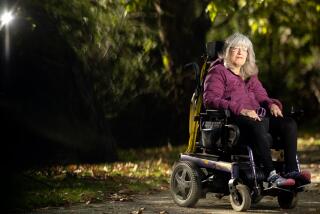Medi-Cal Rolled by Suppliers
- Share via
Re “California Pays Steep Prices for Wheelchairs,” July 20: Your comparison of the cost of a motorized wheelchair to the price of a Mercedes-Benz is gratuitous and does not advance the conversation about the needs of California residents with disabilities or the responsibility of the state to support their independence. One might as well note that the cost of three nights in a hospital’s intensive-care unit is the same as a grand tour of Europe. For those who need the wheelchair or those who need the services of the hospital, the luxury car or the vacation is not a choice.
The cost of the new generation of wheelchairs is high because they have become highly sophisticated and tailored to the individual needs of each user. More significant for the catastrophically disabled, the new technology promotes independence in unprecedented ways. It is right to encourage Medi-Cal to seek the most cost-effective avenues for providing such equipment to those who need it; at the same time, the system should examine its own cumbersome review processes and the costly inefficiencies inherent in bureaucracy. But it is certainly not right to confuse the issue with images of luxury.
Lucy Blackmar
David Alpaugh
Los Angeles
*
Your article about the alarming rate of cost increases in Medi-Cal’s purchases of wheelchairs offered no great revelations. Just a repeat of old news: State and federal bureaucracies are totally inept at managing their resources. The real news is how the remarkable advances in wheelchair technology have allowed disabled individuals, who a few short years ago would have been prisoners to their homes and institutions, to become productive members of their communities.
My disabled son recently graduated from UC Berkeley and has been a productive, taxpaying citizen. I shudder to think what his life would be like without the tremendous advances in wheelchair technology. Medi-Cal’s investment in wheelchair technology is surely bloated and needs a major overhaul, but the thought that 21st century technology would be taken away from disabled adults is beyond one’s logical comprehension. What would be valuable is an analysis of Medi-Cal’s return on investment for these technologically advanced-wheelchair users, comparing the cost of institutionalizing a disabled person with the freedom that wheelchair technology allows.
Richard W. Feldman
Los Angeles
More to Read
Sign up for Essential California
The most important California stories and recommendations in your inbox every morning.
You may occasionally receive promotional content from the Los Angeles Times.










